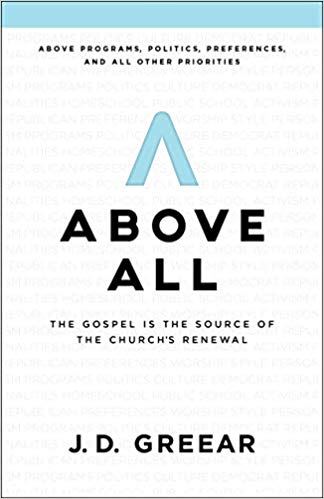What Is the Gospel and Why Is it Good News?

The word gospel has been used so commonly for so long that it’s become all but stripped of its meaning.
There’s gospel-centered preaching, gospel-centered kids Sunday school, gospel-centered worship, gospel-centered tree and shrub removal. Okay, one of those I made up. (Maybe.) But “the gospel” has become shorthand for whatever is important to us in Christianity at the moment.
It’s also become a label we slap on things to assure newcomers that our church is hip, up-to-date, and theologically-certified. But is that all the gospel has become?
A label?
What does it mean for the gospel to function as the power of God in our churches?
If the gospel is truly God’s raw power, we had better have it in the right place.
After Paul declares to the Romans that the gospel message is the power of God, he spends ten chapters explaining how the gospel works. We might summarize Paul’s chapters by saying...
The gospel is the good news that:
We were dead in our trespasses and sin.
Religion couldn’t help us.
New resolutions to change couldn’t help us.
Jesus, the baby born of a virgin in Bethlehem, was the Son of God.
He did what we couldn’t do. He lived a righteous life that pleased God.
Still, he got crucified on a cross under the curse of sin.
He did that for us.
He died in our place.
But Jesus was raised from the grave to offer new life in his Spirit.
Jesus gives this new life to all who call upon him in faith.
The beauty of the gospel is that those who trust in Jesus need never again fear alienation from God.
In Christ, you are secure. In Christ you are loved. In Christ you are whole. In Christ you are chosen. In Christ you are pure. “Therefore, there is now no condemnation for those in Christ Jesus” (Rom. 8:1).
And now Christ has redeemed us to a life of a love and service, where we can reflect to others what he has done in us.
Simply believing this, Paul says, releases into us the power of God to make it so. Renewing our minds in this message, he tells the Romans, transforms ordinary, sinful people into the kinds of people who accomplish the very will of God (Romans 12:1–2).
In his letters to the Corinthians, Paul says the gospel’s inherent power means there’s nothing more important to talk about in the church than it. It is, literally, “in the first place.” It is primary. (1 Corinthians 15:3–4)
Paul even goes as far to say that there is nothing else he really cares about the people in his churches knowing.
Christ and Christ crucified is enough (1 Corinthians 2:2). He tells Titus, his young protégé, that the gospel of God’s grace not only bestows forgiveness but all the power they need to live godly lives in this world (Titus 2:11–12).
Believing the gospel is not only how you get released from the penalty of sin, it’s how you get released from the power of sin, also.
Because of the unparalleled power of the gospel, it is not something the biblical writers expect us to learn on the Romans Road and then leave behind.
It contains everything necessary for success in the Christian life.
It’s not just the 101 class of a four-year Christianity major.
Not just the diving board off of which we jump into the pool of Christianity.
Not just the milk that nourishes us until we are mature enough for meat.
The gospel is the meat.
And the dessert too, for that matter.
More than just the 101 introductory class to Christianity, it’s the entire campus at which classes are held.
More than just the diving board, it’s the whole pool.
The way you grow in Christ is the way you began in Christ: faith in the finished work and the empty tomb. To progress is always to begin again.
Peter says that the gospel is so profound that the angels, who stand around the throne of God every day, long to just catch a glimpse of it (1 Peter 1:11–12). How hard must it be to impress an angel? They understand more theology than we ever will during our lifetimes. They had front row seats to God’s mind-bending creative power that spun billions of stars into space. They saw God split the Red Sea and fill Balaam’s donkey’s mouth with words and sentences.
Angels are themselves so powerful that a mere look at them turns the strongest human into a quivering puddle of fear. Yet these angels are still blown away by the simple gospel message. They want nothing more than to delve more deeply into it.
The beauty of the gospel is endless because the beauty of God is endless.
This means that wherever you are in your journey with Christ – whether you’re in doubt that Jesus really is who he says he is or you’ve been convinced of the gospel’s power for 70 years – you’re just getting started.
And the great news for each of us is that, as Peter says, embedded in the gospel are all the resources you need to become everything God wants you to be (2 Peter 1:3).
Tragically, a lot of Christians have moved on from it.
I was once at a conference where the speaker before me explained that the church had heard enough about the death of Jesus. He said (and I wrote it down word-for-word because I couldn’t believe it), “We need to stop talking so much about Jesus’ death. Everyone already freakin’ knows about that. We need to talk now about his life.”
The Apostle Paul would never had said such a thing. And not just because he would avoid dirty words like freakin’. No, Paul knew that the only way to understand Jesus’ life and experience his power as our own is to lean more fully and deeply into his death.
A brief note here: what are you supposed to do when you are an invited guest and the speaker before you says something like that? Typically, I prefer to honor the role of “guest” and let the conference host answer to God for what has been said.
Typically.
But when dealing with an issue of first importance—the issue of first importance—I had to throw my hat in the ring. I said, “Respectfully, I would encourage you never to do what the previous speaker has told you to do.”
Yep. I did that.
And it was as awkward as you’re imagining it.
Worth it.
Because the gospel is all we’ve got.
Excerpted with permission from Above All by J.D. Greear. Copyright 2019, B&H Publishing Group.

Photo Credit: ©GettyImages/vchal
Originally published July 23, 2019.





